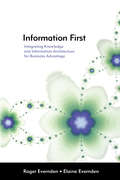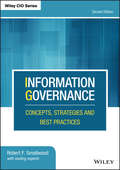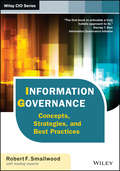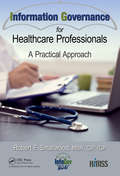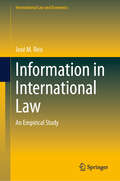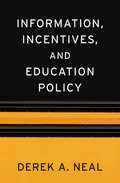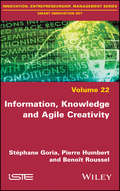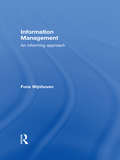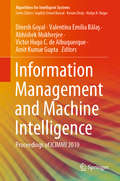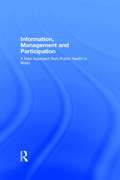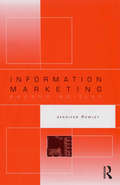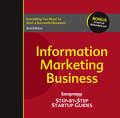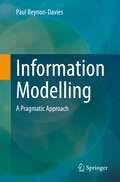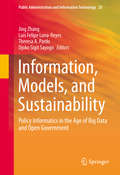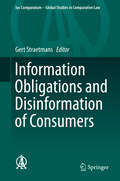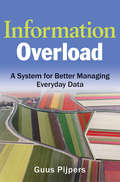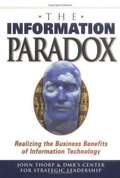- Table View
- List View
Information Executives Truly Need
by Peter F. DruckerThe ability to gather, arrange, and manipulate information with computers has given business people new tools for managing. But data processing tools have done more than simply enable executives to do the same tasks better. They have changed the very concepts of what a business is and what managing means. To manage in the future, executives will need an information system integrated with strategy, rather than individual tools that so far have been used largely to record the past. The executive's tool kit has four kinds of diagnostic information: foundation information, productivity information, competence information, and resource-allocation information. The sources of the information are so diverse, and sifting through and interpreting it for a specific business are so difficult, that even small companies will need help from data specialists.
Information First: Integrating Knowledge And Information Architecture For Business Advantage
by Elaine Evernden Roger EverndenInformation is seriously undervalued and underused as a corporate resource. The pressures of global competition and a growing dependence on information technology mean that the effective use of information is more important now than it has ever been. This book is a fundamental guide for unleashing information potential, by combining the discipline of information architecture with the power of knowledge management, to drive organizational changes.Instead of unlocking the potential of information, people are drowning in detail. Current books only approach this subject from an information technology perspective. This book combines techniques from knowledge management and information architecture to provide a layer above the detail - techniques for seeing the big picture.
Information for Production, Operations, and Logistics: What Managers Need to Know
by Sharon M. Mckinnon William J. Bruns Jr.The complexity of using technology, materials, and human resources as efficiently as possible creates great needs for current information on available resources, manufacturing problems, and output demands. This chapter focuses on information that is used by manufacturing and logistics managers.
Information for Sales and Marketing: What Managers Need to Know
by Sharon M. Mckinnon William J. Bruns Jr.Sales and marketing functions exist to ensure that information about a company's products reaches potential customers in a timely, efficient, and enticing stream, resulting in enough orders to keep the company profitable and growing. This chapter addresses the daily information needs of sales and marketing managers.
Information for the Longer View: What Managers Need to Know
by Sharon M. Mckinnon William J. Bruns Jr.The time horizon is a primary factor in defining what types of information are used by managers. Daily control of operations calls for different data and information than long-range analysis and planning. This chapter discusses the nature of information used in controlling production, sales, and marketing over a longer time period.
Information Governance: Concepts, Strategies and Best Practices (Wiley CIO)
by Robert F. SmallwoodThe essential guide to effective IG strategy and practice Information Governance is a highly practical and deeply informative handbook for the implementation of effective Information Governance (IG) procedures and strategies. A critical facet of any mid- to large-sized company, this “super-discipline” has expanded to cover the management and output of information across the entire organization; from email, social media, and cloud computing to electronic records and documents, the IG umbrella now covers nearly every aspect of your business. As more and more everyday business is conducted electronically, the need for robust internal management and compliance grows accordingly. This book offers big-picture guidance on effective IG, with particular emphasis on document and records management best practices. Step-by-step strategy development guidance is backed by expert insight and crucial advice from a leading authority in the field. This new second edition has been updated to align with the latest practices and regulations, providing an up-to-date understanding of critical IG concepts and practices. Explore the many controls and strategies under the IG umbrella Understand why a dedicated IG function is needed in today’s organizations Adopt accepted best practices that manage risk in the use of electronic documents and data Learn how IG and IT technologies are used to control, monitor, and enforce information access and security policy IG strategy must cover legal demands and external regulatory requirements as well as internal governance objectives; integrating such a broad spectrum of demands into workable policy requires a deep understanding of key concepts and technologies, as well as a clear familiarity with the most current iterations of various requirements. Information Governance distills the best of IG into a primer for effective action.
Information Governance
by Robert F. SmallwoodProven and emerging strategies for addressing document and records management risk within the framework of information governance principles and best practicesInformation Governance (IG) is a rapidly emerging "super discipline" and is now being applied to electronic document and records management, email, social media, cloud computing, mobile computing, and, in fact, the management and output of information organization-wide. IG leverages information technologies to enforce policies, procedures and controls to manage information risk in compliance with legal and litigation demands, external regulatory requirements, and internal governance objectives. Information Governance: Concepts, Strategies, and Best Practices reveals how, and why, to utilize IG and leverage information technologies to control, monitor, and enforce information access and security policies.Written by one of the most recognized and published experts on information governance, including specialization in e-document security and electronic records managementProvides big picture guidance on the imperative for information governance and best practice guidance on electronic document and records managementCrucial advice and insights for compliance and risk managers, operations managers, corporate counsel, corporate records managers, legal administrators, information technology managers, archivists, knowledge managers, and information governance professionalsIG sets the policies that control and manage the use of organizational information, including social media, mobile computing, cloud computing, email, instant messaging, and the use of e-documents and records. This extends to e-discovery planning and preparation. Information Governance: Concepts, Strategies, and Best Practices provides step-by-step guidance for developing information governance strategies and practices to manage risk in the use of electronic business documents and records.
Information Governance for Healthcare Professionals: A Practical Approach (HIMSS Book Series)
by Robert F. SmallwoodLike other critical organizational assets, information is a strategic asset that requires high level of oversight in order to be able to effectively use it for organizational decision-making, performance improvement, cost management, and risk mitigation. Adopting an information governance program shows a healthcare organization’s commitment to managing its information as a valued strategic asset. Information governance serves the dual purpose of optimizing the ability to extract clinical and business value from healthcare information while meeting compliance needs and mitigating risk. Healthcare organizations that have information governance programs will have a competitive edge over others and contributes to safety and quality of care, population health, operational efficiency and effectiveness, and cost reduction initiatives. This is a much-needed book in the healthcare market space. It will explain, in clear terms, how to develop, launch, and oversee an Information Governance program. It also provides advice and insights from leading IG, cybersecurity and information privacy professionals in healthcare.
Information in International Law: An Empirical Study (International Law and Economics)
by José M. ReisExamining state behavior, this book sheds light on the often-overlooked role of information production and diffusion in international law and relations. Most theories of public international law and state behavior rely on a certain degree of international law-related information, such as an international legal ruling, being made public and diffused to reach various key actors such as third states or domestic actors. However, while assumptions about information being produced and diffused permeate international legal scholarly work, these assumptions have not been systematically and empirically evaluated. Based on an empirical analysis, the author challenges prevailing assumptions by systematically evaluating the accessibility and dissemination of crucial international law related information such as treaty negotiation documents or legal rulings. Using a variety of quantitative case studies on key stages of international lawmaking and covering various issue-areas, from human rights to trade law, each chapter traverses three critical levels of analysis, namely whether international law information is public and transparent, whether the information is salient and reaches the general public, and how the information is framed by the media and political elites. The book will appeal to students, researchers, and scholars of law, political science, and economics, as well as policy-makers interested in a better understanding of information production and diffusion in international law and the impact of public opinion on compliance with international law.
Information in the Labour Market: Job-Worker Matching and Its Implications for Education in Ontario
by Glenn Macdonald James DaviesThis study uses a simple model of information gathering to generate policy recommendations concerning education in Ontario, especially at the post-secondary level. The schools are viewed as helping students discover jobs matched to their abilities, and policy prescriptions are offered from that standpoint. After examining earlier economic models of education – seeing it in terms of human capital and signalling – the authors analyse their informational model. In the light of the three theories of education, they then proceed to examine the appropriate role of government in the education market, and offer their policy recommendations. In addition, trends in the structure of education over the last two decades are studied and explained from the economic point of view. They argue that too much has been spent on formal education and not enough on on-the-job-training, but the answer is not more government intervention or vocationalism. Education policy should encourage free choice and an increasing ability to match interests or skills with jobs. Vocationalism merely hinders the latter and endangers economic well-being in the long term.
Information, Incentives, and Education Policy (The\sanford J. Grossman Lectures In Economics Ser.)
by Derek A. NealHow do we ensure that waste and inefficiency do not undermine the mission of publicly funded schools? Derek Neal writes that economists must analyze education policy in the same way they analyze other procurement problems. Insights from research on incentives and contracts in the private sector point to new approaches that could induce publicly funded educators to provide excellent education, even though taxpayers and parents cannot monitor what happens in the classroom. Information, Incentives, and Education Policy introduces readers to what economists know—and do not know—about the logjams created by misinformation and disincentives in education. Examining a range of policy agendas, from assessment-based accountability and centralized school assignments to charter schools and voucher systems, Neal demonstrates where these programs have been successful, where they have failed, and why. The details clearly matter: there is no quick-and-easy fix for education policy. By combining elements from various approaches, economists can help policy makers design optimal reforms. Information, Incentives, and Education Policy is organized to show readers how standard tools from economics research on information and incentives speak directly to some of the most crucial issues in education today. In addition to providing an overview of the pluses and minuses of particular programs, each chapter includes a series of exercises that allow students of economics to work through the mathematics for themselves or with an instructor’s assistance. For those who wish to master the models and tools that economists of education should use in their work, there is no better resource available.
Information, Knowledge and Agile Creativity
by Stéphane Goria Pierre Humbert Benoit RousselInformation, Knowledge and Agile Creativity will enlighten entrepreneurs, and is ideal for facilitating an organization’s ability to react and adapt to its environment. Creativity is a system that engenders innovation. While integral at the conception stage, it is also important before and after this phase. This book offers a collection of tools, as well as a methodology, to estimate the agility of an organization to generate and transform ideas into solutions that are not only new but also adapted to their users. To this end, this book presents strategic foresight and problem comprehension methods; tools of sharing and visual information formatting; animation tips for creativity workshops; techniques for generating ideas; and tools for visualizing and mapping ideas, information, and knowledge.
Information Management: An Informing Approach
by Fons WijnhovenInformation and its management is central to modern society. Organizations – private and public, national and international – have recognized that information is a key resource and that its management is critical for success. Existing books on information management focus on the abilities of computers to process data, the development of information systems, and the management of IT resources. They often start with the computer as a key issue. Although Information Management acknowledges the importance of computers and data communication, it starts from a deeper understanding of the concepts of information and knowledge, and on the basis of this understanding, derives methods to use computers effectively. This textbook provides graduates of any discipline with an understanding of the theory and practice that underpins information management, and introduces students to the concepts and applications of information management techniques in a variety of organizational contexts. In giving students strong philosophical foundations, Fons Wijnhoven's book will prove to be an excellent primer in information management.
Information Management and Machine Intelligence: Proceedings of ICIMMI 2019 (Algorithms for Intelligent Systems)
by Dinesh Goyal Valentina Emilia Bălaş Abhishek Mukherjee Victor Hugo C. de Albuquerque Amit Kumar GuptaThis book features selected papers presented at the International Conference on Information Management and Machine Intelligence (ICIMMI 2019), held at the Poornima Institute of Engineering & Technology, Jaipur, Rajasthan, India, on December 14–15, 2019. It covers a range of topics, including data analytics; AI; machine and deep learning; information management, security, processing techniques and interpretation; applications of artificial intelligence in soft computing and pattern recognition; cloud-based applications for machine learning; application of IoT in power distribution systems; as well as wireless sensor networks and adaptive wireless communication.
Information, Management and Participation: A New Approach from Public Health in Brazil
by Francesco di VillarosaIn order to alleviate poverty, people-oriented projects (those dealing with activities such as institutional development, health, family planning, education, and rural development) must be well-targeted towards the most vulnerable groups. However, official 'top-down' information is incapable of identifying, prioritising and 'marking out' these groups at a local level, and the result is too often an unfair, inefficient and ineffective allocation and use of the resources of social programmes. The author argues that a 'process approach' is often necessary to geneate relevant knowledge about local needs, especially in poor urban and heterogeneous areas. Such an approach fosters flexibility and adaptability to the local context. The book analyses the whole approach to information handling which was developed in the Brazilian project. The different phases are analysed; the collection and processing of data and the construction of an information system to be used for decision-making.
Information Marketing
by Jennifer RowleyThe nature of the information marketplace is under continual evolution and all organisations in the information industry need to form new strategic alliances, identify new market segments and evolve new products, employing a full armoury of marketing tactics to succeed in the changing environment. In this fully revised second edition of Information Marketing Jenny Rowley explores the impact of globalization, digitization, connectivity and customization in the information marketplace. She introduces a number of new topics and a shift of emphasis which reflect both the changing nature of information services and also practical and theoretical perspectives on marketing. As well as being thoroughly revised and updated, themes that are more fully developed include: e-service, self-service, customer relationships, online branding, online marketing communications, measuring online activity and customer relationship management systems. This book's unique perspective makes it essential reading for professionals in information services as well as students in information management, library and information studies, business information, marketing, e-commerce and communication studies.
Information Marketing Business
by Entrepreneur MagazineStart Your Own Information Marketing Business 2EA six-figure income from information? Yes! It sounds easy because it is. You've got information that millions of others are looking for and now you can learn how to package, price and sell it.The experts at Entrepreneur take you step by step, jumpstarting your thinking about your area of expertise and showing you how to convert it into a high-demand information product. Following the example set by today's most successful information marketers, you learn the ins and outs of running your own information marketing business using proven strategies and effective marketing techniques. Whether looking for a side business or a full-time venture-information marketing is a flexible, lucrative business that you can start any time, and everything you need is right here.This kit includes: Essential industry and business-specific startup steps with worksheets, calculators, checklists and more. Entrepreneur Editors' Start Your Own Business, a guide to starting any business and surviving the first three years. Downloadable, customizable business letters, sales letters, and other sample documents Entrepreneur's Small Business Legal Toolkit.
The Information Master: Jean-Baptiste Colbert's Secret State Intelligence System
by Jacob SollJean-Baptiste Colbert saw governance of the state not as the inherent ability of the king, but as a form of mechanical mastery of subjects such as medieval legal history, physics, navigation, and the price lists of nails, sails, and gunpowder. In The Information Master, Jacob Soll shows how the legacy of Colbert's encyclopedic tradition lies at the very center of the rise of the modern state. This innovative book argues that Colbert's practice of collecting knowledge originated in Renaissance Italy, where merchants recognized the power to be gained from merging scholarship and trade. By connecting historical literatures--archives, libraries, merchant techniques, and humanist pedagogy--that have usually remained separate, Soll has created an imaginative and refreshing work.
Information Modelling: A Pragmatic Approach
by Paul Beynon-DaviesThis textbook provides solid guidance on how to produce information models in practice. Information modeling has become increasingly relevant as an approach for understanding the active role that data plays within business and management and promoting the planning of business activities. The text promotes a practical approach to information modelling based around the analysis of communicative practice within delimited domains of organization. The book chapters are designed to be read in sequence. The early chapters build an account of information modelling from the bedrock of a theory of information situations. Later chapters discuss a number of practical issues concerned with the application of this business analysis and design technique. The conclusion demonstrates a larger context for the application and importance of information modelling. Numerous in-text examples of the concepts of information modelling and their application are included throughout the text. A separate chapter is devoted to a range of exercises which the reader can use to test understanding and application of the technique. An appendix with solutions is also provided to support learning. Overall, this textbook provides a step-by-step introduction to information modelling for use in undergraduate and postgraduate modules in information systems, computer science and even digitally focused modules within business and management. No prerequisite knowledge is assumed on the part of the reader. Students and practitioners are tutored in the development of information modelling from first principles. The book covers all the core principles of both entity-relationship diagramming and class diagramming – the two major approaches to information modelling.
Information, Models, and Sustainability
by Jing Zhang Luis Felipe Luna-Reyes Theresa A. Pardo Djoko S. SayogoThis book reflects on the emerging trends, development, and challenges of policy on sustainability using information technology, and provides valuable insights to both research and practice communities. Sustainability has become an important focus for government, civil society and the corporate community world-wide. Growing interest in addressing environmental deterioration and associated social inequality and economic challenges is shifting focus to this important issue. The lack of fresh water and arable land, extreme weather, rising cost of relying on fossil fuels, and poverty and regional instability, are drawing attention to the need for government intervention and policy instruments that encourage the development of sustainable alternatives. Governments can play a very important role in facilitating sustainable development through better public policies. First of all, public investments can be directed toward establishing incentives for renewable energy, energy efficiency, sustainable agriculture, and land and water conservation, or toward leveling the field for sustainable alternatives by phasing out the subsidies directed to unsustainable production and development. Second, regulatory and pricing mechanisms could help with the development of markets for sustainable products. This book engages policy informatics analytical and modeling approaches, stakeholder engagement in policy development, implementation and evaluation, and big data and policy informatics to generate valuable insights in the policy on sustainable energy, and will be on interest to researchers in public administration and sustainability, open data and information technology ecological economics.
The Information Nexus
by Marks Steven G.Capitalism is central to our understanding of contemporary economic and political life and yet what does it really mean? If, as has now been shown to be the case, capital and property rights existed in pre-modern and pre-capitalist societies, what is left of our understanding of capitalism? Steven G. Marks' provocative new book calls into question everything we thought we knew about capitalism, from the word's very origins and development to the drivers of Western economic growth. Ranging from the Middle Ages to the present, The Information Nexus reveals that the truly distinctive feature of capitalism is business's drive to acquire and analyze information, supported by governments that allow unfettered access to public data. This new interpretation of capitalism helps to explain the rise of the West, puts our current information age into historical perspective, and provides a benchmark for the comparative assessment of economic systems in today's globalized environment.
Information Obligations and Disinformation of Consumers (Ius Comparatum - Global Studies in Comparative Law #33)
by Gert StraetmansThis book focuses on recent developments in consumer law, specifically addressing mandatory disclosures and the topical problem of information overload. It provides a comparative analysis based on national reports from countries with common law and civil law traditions in Asia, America and Europe, and presents the reports in the form of chapters that have been drafted on the basis of a questionnaire, and which use the same structure as the questionnaire to allow them to be easily compared. The book starts with an analysis of the basic assumptions underlying the current consumer protection models and examines whether and how consumer models adapt to the new market conditions. The second part addresses the information obligations themselves, first highlighting the differences in the reported countries before narrowing the analysis down to countries with a general pre-contractual information duty, particularly the transparency requirements that often come with such a duty. The next part examines recent developments in the law on food labelling, commercial practices and unfair contract terms in order to identify whether similar traits can be found in European and non-European jurisdictions. The fourth part of the book focuses on specific information obligations in the financial services and e-commerce sectors, discussing the fact that legislators are experimenting with different forms of summary disclosures in these sectors. The final part provides a critical appraisal of the recent developments in consumer information obligations, addressing the question of whether the multiple criticisms from behavioural sciences necessitate abandonment or refinement of current consumer information models in favour of new, more adequate forms of consumer protection, and providing suggestions.
Information Overload
by Guus PijpersWorld-class guidance on using information to achieve better performance Examining the characteristics of information and the latest findings in cognitive science, this book shows how the mind works, how it can be used to think optimally about your business, and how to improve business performance with better information management practices. Provides the process and tools necessary to identify this information and how to remember it, and how to better use the people around you to obtain the best information Reveals how to handle all of the hundreds of pieces of information received daily Provides case studies as well as checklists that show managers how to implement the methodology presented in the book Innovative and ahead of its time, this book helps you take control of all the information that enters your life, get better informed, and have more time for the important issues you face within your business.
The Information Paradox: Realizing the Business Benefits of Information Technology
by John Thorpe Dmr'S Center For Strategic Leadership StaffThorpe and the experts at DMR Consulting show managers how to measure and maximize the benefits of technology.
Information Policy: How to Factor in a Government's Role and Goals
by Carl Shapiro Hal R. VarianBy and large, the information sector continues to operate under long-standing rules of engagement designed for an entire economy. This chapter lays out the principles of competition policy and government intervention, identifies areas where the old rules have proven inadequate, and suggests changes that would ensure that governments support, rather than impede, the growth of the information economy.

